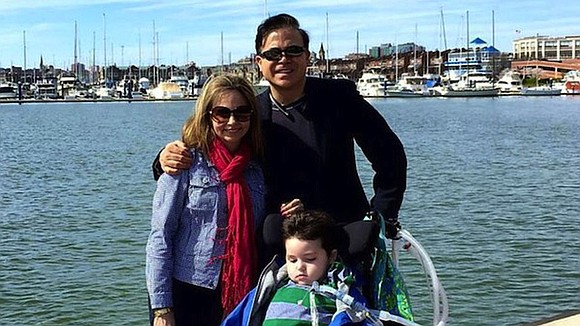His Son Tried the Experimental Treatment Charlie Gard's Parents Want
CNN/Stylemagazine.com Newswire | 7/19/2017, 7:22 a.m.

By Victoria Knight
CNN
(CNN) -- An American father is speaking out about his child's experience with an experimental treatment the parents of Charlie Gard are fighting for their baby to access.
Arthur Estopinan said his son, Arturo, was diagnosed with the same rare disease that Charlie has, mitochondrial DNA depletion syndrome, when he was 1 -- though Arturo's is said to be a less severe variation of the disease. The disease causes muscle weakness and loss of motor skills, which means standing, walking, eating, talking or even breathing is almost impossible.
Arturo was born in 2011. Estopinan was initially told by doctors that his son would die a few months after his diagnosis and that there was no medical treatment for his condition.
Estopinan told HLN's Erica Hill on Tuesday that he and his wife, Olga, were determined to do something.
"I started calling all of the doctors I could, from Harvard to Stanford and everyone in between, Ohio, and all of the major pediatric medical centers," Estopinan said. "Eventually, the last one was Dr. Hirano in New York City. I was this close to telling my wife, 'there's nothing we can do.' Thank God, Dr. Hirano said, 'we're doing a clinical protocol, and we believe these medications will help your son.' "
Dr. Michio Hirano, a neurologist at Columbia University Medical Center in New York who specializes in myopathies and other neuromuscular diseases, has developed an experimental therapy that has been used on at least one American patient. That one known patient was Arturo, and his father said the treatment helped the boy start moving his muscles.
"They have allowed him to get stronger by moving his arms, his fingers, his legs. He's even trying to move his hips," Estopinan said. "The other day, I put one of these new songs from 'Sing,' from the Disney movie, on, and he started to move his hip and stomach. He's definitely willing to dance, God willing, very soon."
British baby Charlie Gard has been at the center of a legal battle between Great Ormond Street Hospital in London -- where Charlie has been since October and remains on life support -- and his parents, Chris Gard and Connie Yates. The couple raised money to bring their son to the United States for Hirano's experimental treatment, although a court order prohibited Hirano from being revealed as the doctor until last week.
The hospital stepped in, however, saying the treatment would be unjustified because all medical options had been explored. On June 30, the European Court of Human Rights decided not to intervene in the case, which upheld a British Supreme Court decision that the hospital could discontinue life support to Charlie and that he could not be transferred.
Then, last week, the UK High Court began yet another hearing at the request of the hospital to consider "new evidence relating to potential treatment for his condition."
Hirano, testifying by video from the US, told Justice Nicholas Francis on Thursday that he did not think Charlie necessarily had brain damage and that he believed there was an "11% to 56% chance of clinically meaningful improvement" to the baby's muscular function if treatment were pursued.
Hirano traveled to London to examine Charlie and meet with his doctors and other members of the medical team on Monday and Tuesday. A representative for Great Ormond Street Hospital confirmed that Hirano went to the hospital on Monday but would not confirm that he examined Charlie.
"For the purpose of this visit, this gives them the same status as our own clinicians and allows them both to examine the patient and to have full access to our records and facilities," a statement said.
The physicians will have access to all clinical systems, including diagnostic images, and the hospital's clinical staff will be on hand to facilitate the visit where they will be able to clinically examine Charlie.
Yates and an individual whose identity is unknown, as mandated by a court order, have also been in attendance throughout these meetings and assessments. A court order also prevents any participant from discussing what has taken place.
After hearing Hirano's assessment, Francis expects to make a court decision by July 25.
Estopinan was motivated to speak out about his son's disease and treatment after hearing about Charlie's situation, he said. He was the one who connected Charlie's parents to Hirano last year. After attending a conference in the Netherlands where he talked about Arturo's condition, Estopinan also recently met with Charlie and his parents in London.
"I was there for three days. We prayed every day with his parents. They're really strong people," he said.
Estopinan said he couldn't be sure that the treatment used on his son could work for Charlie, because he's not a medical doctor. But he has advised other parents whose children have the same mitochondrial condition to try Hirano's experimental treatment.
Estopinan again emphasized his support for Charlie's parents and giving them the chance to try the treatment.
"This little boy needs his experimental medications," he said. "We're wasting time. Time is ticking, and time is not on Charlie's side."
CNN's Debra Goldschmidt, Richard Greene and Milena Veselinovic contributed to this report.



